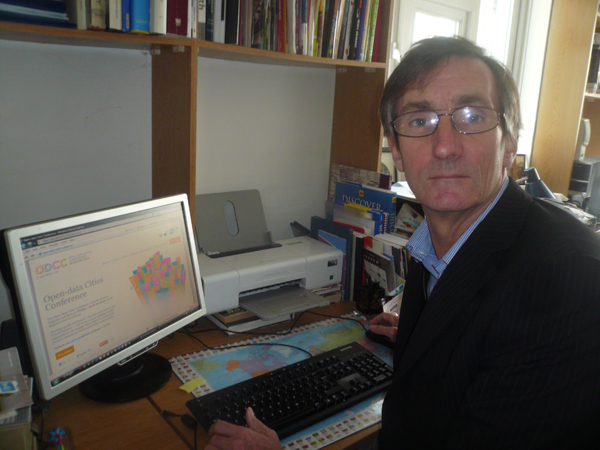Open Data City
An internet entrepreneur from Brighton is bringing the brightest and best to our city on a mission

Brighton is hosting Britain’s first “open data cities” conference on Friday 20 April. The event underlines the growing importance of our city in the digital world of tomorrow. It will bring together people trying to use information and technology to make it easier for us to live and work. The speakers include Tom Steinberg, who founded mySociety, which runs practical websites such as Fix My Street, making it simpler for people to report potholes and other problems to the council.
Internet entrepreneur Greg Hadfield is the man behind the conference. He was the first national newspaper journalist to leave Fleet Street for the internet in the mid-1990s. A former news editor of The Sunday Times, he and his son Tom – then aged 12 – created Soccernet, the world’s most popular football website, in 1995. Four years later, after Soccernet was sold for $40 million, Mr Hadfield created Schoolsnet, an education website. He sold it to a company co-owned by Jeremy Hunt, now the Culture Secretary.
Mr Hadfield, who lives near Fiveways, also set up Open Data Brighton and Hove. The organisation taps into the extraordinary blend of digital and creative types who choose to base themselves in the city. They include developers, designers, journalists and artists. And, supported by the open data volunteers, he aims to help Brighton and Hove become the first world class open data city in the country.
What is an open data city? A place where public bodies such as the council, police and health services make as much information as possible freely and openly available without unnecessary licensing restrictions. These organisations collect vast quantities of data and in the old days would have kept it to themselves. A growing number are appreciating the value of allowing others to see and use that information.
Mr Hadfield said: “Increasingly, the most successful cities will be the ones that are the most connected, where digital technologies are seamlessly integrated into everyday life, as omnipresent and as invisible as the air we breathe.” As an example he cited the spread of smart phones loaded with apps. More and more, we rely on them for the news, to tell us when the next bus or train is due or where we can eat or drink near by.
He said: “We envisage a city in which every individual and business can use and repurpose public data to help create a more vibrant and sustainable future, with more efficient public services, more effective voluntary organisations and more enterprising private businesses.
“Brighton has a history of innovation ever since it was connected to London by the railway network in the 1840s. The line was the first main line in the country to be electrified throughout. Since the dawn of the internet age Brighton has been a leader. It had two internet service providers (ISPs) in the 1990s, when there were only a handful in the whole country.
“In Wired Sussex, it has a well established and vibrant network of more than 2,100 companies and freelancers in creative, digital and information technology industries. It is uniquely well placed to enjoy the benefits that will accrue to the most networked cities in an increasingly networked world – in short, cities that ‘think like the web’.”
Many others agree. Some of them are graduating from Brighton’s two universities each year. One of those who sees the benefits of open data is John Barradell, chief executive of Brighton and Hove City Council and a speaker at next week’s conference. As he and his staff look to save money while serving the people of Brighton and Hove as well and efficiently as possible, open data offers hope. Councillor Jason Kitcat, who is expected to take over as leader of the council next month, is another key figure who has shown an understanding of its potential.
The hard part will be turning good intentions into practical achievements. The Open Data Cities Conference will tackle exactly this sort of issue. It takes place at the Corn Exchange in Brighton from 9am to 5pm on Friday 20 April. Tickets cost £120 +VAT from http://opendatacitiesconference.com





















